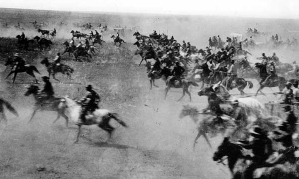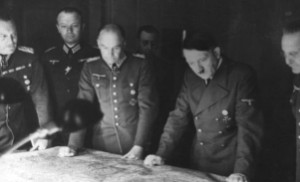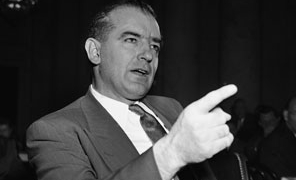April 22nd History Lesson
April 22, 1778: Commander John Paul Jones, leading a small detachment of two boats from his ship, the USS Ranger, raided the shallow port at Whitehaven, England. By his own account, 400 British merchant ships were anchored. Jones was hoping to reach the port at midnight, when ebb tide would leave the shops at their most vulnerable.
Jones and his 30 volunteers had greater difficulty than anticipated rowing to the port, which was protected by two forts. They did not arrive until dawn. Jones’ boat successfully took the southern fort, disabling its cannon, but the other boat returned without attempting an attack on the northern fort, after the sailors claimed to have been frightened away by a noise. To compensate, Jones set fire to the southern fort, which subsequently engulfed the entire town.

April 22, 1889: At precisely high noon, thousands of would-be settlers made a mad dash into the newly opened Oklahoma Territory to claim cheap land. The nearly two million acres of land opened up to white settlement was located in Indian Territory, a large area that once encompassed much of modern-day Oklahoma.
President Benjamin Harrison had chosen to open a 1.9 million-acre section of Indian Territory that the government had never assigned to any specific tribe. By the appointed day more than 50,000 hopefuls were living in tent cities on all four sides of the territory. When the hands of the clock reached noon, a cannon fired and thousands of “Boomers” streamed into the territory in wagons, on horseback, and on foot. By nightfall, they had staked thousands of claims either on town lots or quarter section farm plots. Towns like Norman, Oklahoma City, Kingfisher, and Guthrie sprang into being almost overnight.

April 22, 1945: Adolf Hitler, learning from one of his generals that no German defense was offered to the Russian assault at Eberswalde, admitted to everyone in his underground bunker that the war was lost and that suicide was his only recourse.

April 22, 1954: In an effort to reinvigorate his declining popularity, Senator Joseph McCarthy began hearings investigating the United States Army, which he charged with being “soft” on communism. These televised hearings gave the American public their first view of McCarthy in action, and his recklessness, indignant bluster, and bullying tactics.
Four years earlier, Senator McCarthy had charged that there were over 200 “known communists” in the Department of State. Thus began his dizzying rise to fame as the most famous and feared communist hunter in the United States. McCarthy adeptly manipulated the media, told ever more outrageous stories concerning the communist conspiracy in the United States, and smeared any opponents as “communist sympathizers” to keep his own name in the headlines for years.
But the hearings were a fiasco for McCarthy. He constantly interrupted with irrelevant questions and asides; yelled “point of order” whenever testimony was not to his liking; and verbally attacked witnesses, attorneys for the Army, and his fellow senators. The climax came when McCarthy slandered an associate of the Army’s chief counsel, Joseph Welch. Welch fixed McCarthy with a steady glare and declared evenly, “Until this moment, Senator, I think I never really gauged your cruelty or your recklessness…Have you no sense of decency, sir, at long last?”
April 22, 1970: Earth Day, the brainchild of Senator Gaylord Nelson of Wisconsin, a staunch environmentalist who hoped to provide unity to the grassroots environmental movement and increase ecological awareness, made its debut. The event increased environmental awareness in America, and in July of that year the Environmental Protection Agency was established by special executive order to regulate and enforce national pollution legislation.
April 22, 1972: Antiwar demonstrations prompted by the accelerated U.S. bombing in Southeast Asia drew somewhere between 30,000 to 60,000 marchers in New York; 30,000 to 40,000 in San Francisco; 10,000 to 12,000 in Los Angeles; and smaller gatherings in Chicago and other cities throughout the country.

April 22, 1994: Former President Richard M. Nixon died after suffering a stroke four days earlier. Often remembered for his involvement in the Watergate scandal as president and for his Cold War-era persecution of suspected communists while serving as a U.S. senator, Nixon left a legacy as complex as his personality.
Despite the immense disappointment and distrust in government that the Watergate scandal inspired in most Americans, Nixon was correct in assuming that some aspects of his leadership would be judged favorably with the passage of time. These include his bold efforts to improve diplomatic relations with China and Russia, as well as pushing lasting and influential legislation through Congress. Nixon’s legislative legacy includes the National Environmental Policy Act, passed in 1969, which created the Environmental Protection Agency, the Clean Water Act of 1972 and the Endangered Species Act of 1973. He also lowered the voting age to 18, established Amtrak, launched the space-shuttle program and authorized the formation of the Occupational Safety and Health Administration.

April 22, 2004: Pat Tillman, who gave up his pro football career – and his multi-million dollar contract with the Arizona Cardinals – to enlist in the U.S. Army after the terrorist attacks of September 11, was killed by friendly fire while serving in Afghanistan. The news that Tillman, age 27, was mistakenly gunned down by his fellow Rangers, rather than enemy forces, was initially covered up by the U.S. military.